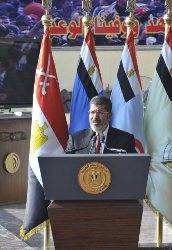President Mohamed Morsi has defied Egypt's top court and its powerful military council by ordering the country's dissolved parliament back to work.
Morsi issued a decree on Sunday withdrawing the Supreme Council of the Armed Forces decision last month to dissolve parliament, which came after the Supreme Constitutional Court found that the legislature had been elected using an ‘unconstitutional’ method.
The decree states that Morsi decided to restore the elected People's Assembly, which was voted into office over three months beginning in November, and reconvene it in session to begin issuing legislation again.
The Muslim Brotherhood's political party won nearly half of the assembly and Morsi, though he stepped down from a leadership position in the Brotherhood, is still a member.
The decree appears to be an attempt by Morsi to bring parliament back without directly contradicting the supreme court.
Rather than address the court's decision, which stated that parliament should be dissolved, Morsi cancelled the subsequent move by the SCAF - at the time the acting executive power - to implement the court's decision.
For the past month, the Brotherhood has argued that the court's decision was wrong and the SCAF had no legal right to dissolve parliament.
It was unclear on Sunday night whether Morsi had consulted with the military or other political powers before issuing his decree. High-ranking Brotherhood members said they had not been personally consulted, the SCAF convened an "emergency meeting" to discuss it, and the court said it too would meet on Monday to evaluate the decree.
In a possible nod to the court, Morsi's decree also called for new parliamentary elections to be held within 60 days of the adoption of a new constitution for the country, which is tentatively expected late this year.
A constitutional assembly selected by the erstwhile parliament has been formed and has begun the work of drafting the constitution.
The Brotherhood's parliamentary victory alarmed many secularists, liberals and members of the Christian minority, who seemed to be generally pleased when the parliament was dissolved. Some prominent secular politicians, including Mohamed ElBaradei, criticized Morsi's decision on Sunday.
Egypt's top court handed down the controversial decision to dissolve parliament a day before the second round of the presidential election, which pitted Morsi against former regime official Ahmed Shafiq.
The court ruled that it was ‘unconstitutional’ for political parties to have contested the one-third of parliamentary seats reserved for candidates running as individuals.
The ruling prompted allegations that the court was acting as an arm of the military council, which has sought to constrain the powers of the rising Muslim Brotherhood.
Those allegations grew when, two days after the ruling and minutes after polls closed in the presidential voting, the SCAF issued a unilateral package of constitutional amendments limiting presidential powers and giving itself the role of the dissolved parliament.
Morsi's decree did not state whether SCAF would lose those self-prescribed legislative abilities once the dissolved parliament returns to work.
Unanswered questions
Al Jazeera's Rawya Rageh, reporting from Cairo, said it remained unclear whether Morsi was challenging the generals or had worked out an agreement with them beforehand.
"It is a very interesting move because there are questions as to what exactly the decree means ... is this a true act of defiance on part of the new president against the generals, or was this a decision that was taken after consultation, and in coordination with, these generals," she said.
"It is very difficult to tell at this moment how this decision came about given all the legal complexities involved."
The Brotherhood has argued that the SCAF had no right to dissolve the parliament "and therefore this seems to be an administrative correction of what they believe was a previous erroneous administrative decision," Rageh said.
The Brotherhood said parliament's dissolution should be put to a popular referendum.
Under Egypt's interim constitution, approved by referendum after the 2011 uprising against Hosni Mubarak, no institution is given authority to dissolve parliament, and no rules are stated governing such a situation.
The president is given the power to call parliament into normal session.
PHOTO CAPTION
Egypt's new President Mohamed Mursi delivers a speech during a ceremony where the military handed over power to Mursi at a military base in Hikstep, east of Cairo, June 30, 2012.
Al-Jazeera


 Home
Home Discover Islam
Discover Islam Quran Recitations
Quran Recitations Lectures
Lectures
 Fatwa
Fatwa Articles
Articles Fiqh
Fiqh E-Books
E-Books Boys & Girls
Boys & Girls  Women
Women










